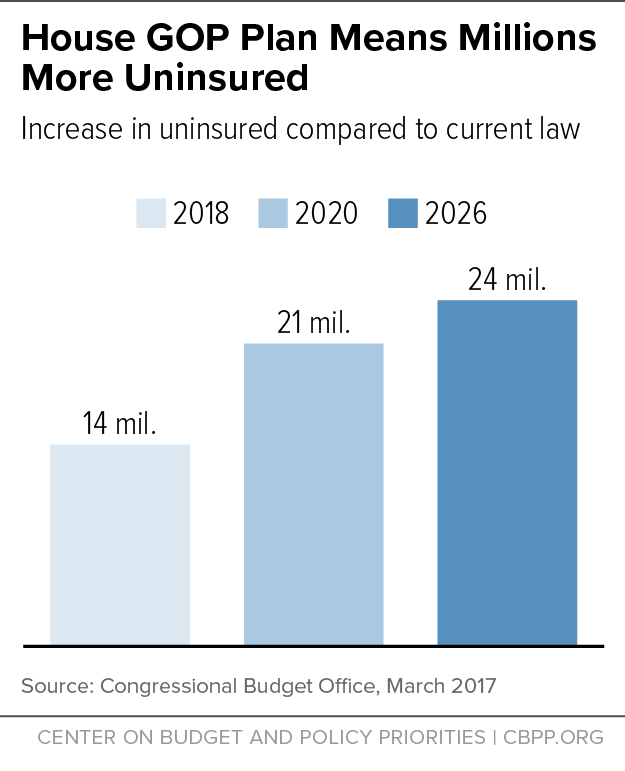BEYOND THE NUMBERS
In Case You Missed It…
This week at CBPP, we focused on health care, the federal budget and taxes, housing, state budgets and taxes, Social Security, food assistance, and the economy.
- On health care, Edwin Park highlighted estimates by the Congressional Budget Office (CBO) showing that the House Republican health plan would cause 24 million people to lose coverage by 2026. Jacob Leibenluft pointed to the CBO findings to highlight the gap between the President’s health care promises and reality, including how millions of low- and moderate-income Americans would pay more for less coverage under the Republican plan. Leibenluft also contrasted the administration’s promises to protect Medicaid beneficiaries with the House bill that would effectively end expansion, leaving out millions in the process, and he showed that deficit reduction in the House plan goes hand in hand with the loss of coverage for millions. Jessica Schubel provided Arizona as an example of why the House plan would likely end the Medicaid expansion and she unpacked how little-noticed Medicaid changes in the House plan would worsen coverage for children, seniors, and people with disabilities. Hannah Katch explained that the Republican proposal to restructure Medicaid would make providers less willing to accept patients, thereby threating access to care for millions of children, seniors, and parents. Paul Van de Water pointed out that the House bill would weaken Medicare by repealing a payroll tax on high earners. Aviva Aron-Dine and Tara Straw explained that the tax credits in the House plan would make health insurance far less affordable in high-cost states, disproportionately hurting rural residents. Sarah Lueck noted that the House plan needs a $100 billion “stability fund” to maintain the individual insurance market. Lueck also found that the health bill proposed by Senators Bill Cassidy and Susan Collins would weaken the Affordable Care Act’s coverage and consumer protections. Peggy Bailey clarified that African Americans have much to lose under the House Republican health plan.
- On the federal budget and taxes, Robert Greenstein emphasized that Trump’s budget proposals threaten programs for the very people he promised to help. David Reich and Chloe Cho outlined the risks of continuing to cut non-defense discretionary appropriations. Isaac Shapiro warned that Trump’s plans to propose large cuts in the number of federal employees when federal employment is already at its lowest ever level undermines basic services. Sharon Parrott, Reich, and Shapiro summarized President Trump’s troubling fiscal agenda ahead of the release of his skinny budget. Brandon DeBot, Emily Horton, and Chuck Marr detailed how the President’s budget cuts would hamper the IRS’s capacity to perform basic functions. Richard Kogan found that Trump’s budget proposal contains substantially less detail than the initial budgets of the last five administrations, and he pointed out that although the President’s budget calls for cutting 2017 funding for non-defense discretionary programs by $18 billion, it gives no details on which programs the President wants to cut. Michael Leachman applauded New Mexico lawmakers for rescinding the state’s resolution to call for a constitutional convention.
- On housing, Douglas Rice made clear that the President’s budget proposal to cut spending for the Department of Housing and Urban Development will increase homelessness, end the federal role in community development, and increase hardship for families in the nation’s poorest urban and rural communities.
- On state budgets and taxes, Iris Lav and Michael Leachman warned that federal grants that help state and local governments finance critical programs are at risk of being substantially diminished or eliminated. Lav explained that President Trump’s budget proposal would slash state and local grants, hitting low-income families particularly hard.
- On Social Security, Kathleen Romig urged the President and Congress to increase the Social Security Administration’s funding to bolster the agency’s ability to meet demands and ensure quality service.
- On food assistance, Dottie Rosenbaum noted that the number of SNAP (formerly food stamps) recipients has fallen over the last four years.
- On the economy, we updated our chart book on the legacy of the Great Recession and our backgrounder on how many weeks of unemployment compensation are available.
Chart of the week: House GOP Plan Means Millions More Uninsured
A variety of news outlets featured CBPP’s work and experts recently. Here are some highlights:
Mr. Trump’s Tear-Down Budget
New York Times
March 16, 2017
Trump Unveils 'Hard Power' Budget That Boosts Military Spending
NPR
March 16, 2017
Trump’s budget shows a GOP trapped between its past and its future
Washington Post
March 16, 2017
Once again: The Republican health plan affects Trump-supporting places more negatively
Washington Post
March 14, 2017
American Health Care Act: Last Week Tonight
Last Week Tonight with John Oliver (HBO)
March 12, 2017
Don’t miss any of our posts, papers, or charts — follow us on Twitter, Facebook, and Instagram.

